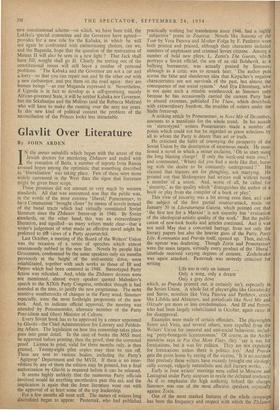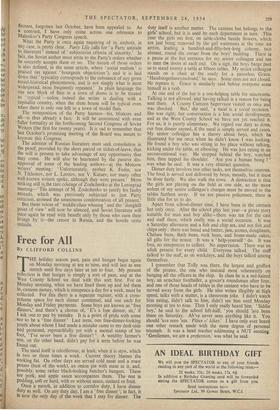Glavlit Over Literature
By JOHN ARDEN IN the annus mirabilis which began with the arrest of the Jewish doctors for murdering Zhdanov and ended with the execution of Beria, a number of reports from Russia aroused hopes among the optimistic that something described as ' liberalisation' was taking place. Few of these were more widely canvassed in the West than the signs that literature might be given freer scope.
These promises did not amount to very much by western standards. All that was announced was that the public was, in tl-ie words of the most extreme ' liberal,' Pomerantsev, to hal e Communism ' brought closer' by means of novels instead of the, banal tracts which had virtually constituted Soviet literature since the Zhdanov freeze-up in 1946. By Soviet standards, on the other hand, this was an extraordinary liberation, and signified—as many writers made clear—that a writer's judgement of what made an effective novel might be preferred to tht views of a Party apparatchik. Last October, a meeting of the Board of the Writers' Union was the occasion of a series of speeches which almost unanimously rubbed in the new line. Novels by people like Grossmann, condemned by the same speakers only six months previously at the height of the anti-semitic drive, were rehabilitated. together with such works as those of Ilf and Petrov which had been censured in 1948. Stereotyped Party fiction was ridiculed. And, while the Zhdanov decrees were not mentioned, almost every speaker quoted Malenkov's speech to the XIXth Party Congress, orthodox though it had sounded at the time, to justify the new programme. The mast sensitive weathercocks of changes in the Party wind, Simonov especially, were the most forthright proponents of the new look. And, to indicate official approval, the meeting was attended by Ponomarenko, alternate member of the Party Praelidium and (then) Minister of Culture.
Every Soviet book has to be approved by a censor appointed by Glavlit—the Chief Administration for Literary and Publish- ing Affairs. The legislation on how this censorship takes place goes into great detail. In the case of books the MSS must be approved before printing, then the proof, then the corrected proof. Licence to print, valid for three months only, is then granted. Twenty-eight pilot copies may then be run off. These are sent to various bodies, including the Party's ' Agitprop ' Department and the MVD. If there is no inter- 4ntion by any of them the edition may be printed, but a final authorisation by Glavlit is required before it can be released. It seems highly unlikely that the numerous Party officials involved would let anything unorthodox past this net, and the implication is again that the freer literature went out with the approval of at least some of the top leadership. practically nothing but translations since 1946, had a highly `subjective' poem in Znantya. Novels like Seasons of the Year by Vera Panova and Mother Volga by F. Panferov were both printed and praised, although their characters included numbers of unpleasant and criminal Soviet citizens. Among a number of bold new plays, L. Zorin's The Guests, which portrays a Soviet official, the son of an old Bolshevik, as a bullying bureaucrat, was actually praised by Simonov, although as a critic was to remark later, The author puts across the false and slanderous idea that Kirpichev's negative characteristics are not survivals of the past, but almost the consequence of our social system.' And Ilya Ehrenburg, who is not quite such a reliable weathercock as Simonov only because he has occasionally carried the current Party linc' to absurd extremes, published The Thaw, which described. with extraordinary freedom, the troubles of writers under the Stalin freeze-up.
A striking article by Pomerantsev. in Novi Mir of December,, amounts to a manifesto for the whole trend. In his assault- on stereotyped' writers Pomerantsev made a number of; points which could not but be regarded as grave solecisms by all to whom the Party is dearer than art or truth. He criticised the habit of conveying the prosperity of the.0;2 Soviet Union by the description of enormous meals. He men- tioned a novel in which a miner exclaims. Oh to start usin the long blasting charge! If only the week-end were over I and commented, Where did you find a mole like that, burn- ing with the desire to be constantly underground ? ' He claimed that tractors are for ploughing. not marrying. He pointed out that Shakespeare had written well without being a member-of a union. And, worst of all, he called for sincerity,' as the quality which distinguishes the author of a book or play from the compiler of a book or play.' This view of sincerity was a bit strong even then, anti was the subject of the first partial counter-attack, made on January 30 in Literaturnaya Gazeta, which pointed out that the first test for a Marxist' is not sincerity but evaluation of the ideological-artistic quality of the work.' But the publi- cation of new-look books and articles continued. And it was not until May that a concerted barrage, from not only the literary papers but also the heavier guns of the Party, Party Life, Konununist and Pravda itself, opened up. Then, indeed. the uproar was deafening. Though Zorin and Pomerantsev were the main targets, virtually every product of the liberal' interlude received varying degrees of censure. Zoshchenko was again attacked. Pasternak was severely criticised for writing Life too is only an instant . . Only a song, only a dream Only a grey dove which, as Pravda pointed out, it certainly isn't, especially in the Soviet Union. A whole list of playwrights like Gorodetsky and Surov, novelists like Vera Panova and Panferov. critics like Lifshits and Abramov, and periodicals like Novi Mir and Oktyabr got more or less condemnation. And Ilf and Petrov, who had been largely rehabilitated in October, again came in for disapproval.
Examples were made of certain offenders. The playwrights Surov and Virta, and several others, were expelled from the Writers' Union for immoral and anti-social behaviour, includ- ing petty-bourgeois licentiousness.' Of course, as the Archi- mandrite says in Put Out More Flags, they say it was for fornications, but it was for politics. They are not expulsing for fornications unless there is politics too.' And Pravda gets the point home by saying of the victims, It is no accident that precisely these writers have recently brought out ideologi-, cally corrupt, vulgarly naturalistic and dull literary works. . . . Early in June writers' meetings were called in Moscow and Leningrad under Party auspices to.revile the defeated tendency. As if to emphasise the high authority behind the change, Simonov was one of the most effective speakers, especially against Zorin. decrees, forgotten last October, have been appealed to. As a contrast, I have only come across one reference to Malenkov's Party Congress speech.
What the Party is once again requiring of its authors, in any case, is pretty clear. Party. Life calls for ' a Party attitude to literature' instead of ' subjectivist criteria of sincerity.' In faCt, the Soviet author must write to the Party's orders whether he sincerely accepts them or no. The nature of those orders is also defined, in the same article, where `social realism' is praised (as against bourgeois objectivism '), and it is laid down that typicality corresponds to the substance of any given social-historical phenomenon, and is not simply what is most widespread, most frequently repeated.' In plain language the one new block of flats in a town of slums is to be treated as typical '—unless indeed the writer is dealing with a capitalist country, when the slum house will be typical even when there is only one left in a town of model flats.
The reimposition of the Party harness—bit, blinkers and all—is- thus already a fact It will be announced with even fuller formality at the forthcoming Second Congress of Soviet Writers (the first for twenty years). It is sad to remember that last October's promising meeting of the Board was meant to keynote this Congress.
The admirer of Russian literature must seek consolation in the proof, provided by the short period on ticket-of-leave, that the will is present to take advantage of any opportunity that may come. He will also be heartened by the passive dis- approval of some of the leading authors—at the Moscow writers' meeting: ' Unfortunately, neither K. Fedin, nor N. Tikhonov, nor L. Leonov, nor V. Kataev, nor many other well-known writers spoke, although they were present.' More striking still istthe rare courage of Zoshchenko at the Leningrad meeting—' The attempt of M. Zoshchenko to justify his faulty attitude, which was previously subjected to just Party. criticism, aroused the unanimous condemnation of all present.'
But these voices of middle-class whining' and the dunghill point of view' will now be silenced, and Soviet literature will once-again be read with benefit only by those who earn their livings by it—the censor in Russia, and the hostile critic outside.



































 Previous page
Previous page